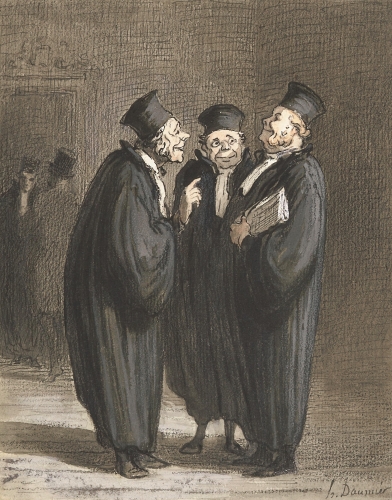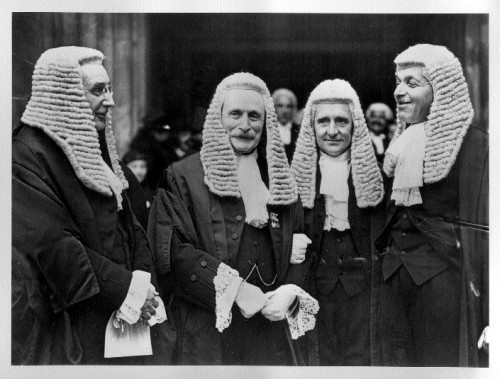vendredi, 02 février 2024
Le juge reprend désormais le flambeau des politiques

Le juge reprend désormais le flambeau des politiques
Jan Sergooris
Source : Nieuwsbrief Knooppunt Delta, no. 186, janvier 2024
Le 30 novembre 2023, la Cour d'appel de Bruxelles a rendu un arrêt (dans l'affaire du climat) ordonnant à la Région flamande, à la Région de Bruxelles-Capitale et à l'État belge de réduire les émissions de gaz à effet de serre de 55 % d'ici 2030 par rapport à 1990. Les trois juges de la Cour d'appel de Bruxelles se sont référés dans leur motivation à la Convention européenne des droits de l'homme (CEDH) et plus particulièrement au droit à la vie (art. 2) et au droit au respect de la vie privée (art. 8). (source : De Standaard, 2 le 3 décembre 2023).
Cet arrêt fait suite à un arrêt rendu en 2015 aux Pays-Bas, dans lequel l'organisation environnementale Urgenda a gagné un procès sur le climat contre l'État néerlandais, exigeant que le gouvernement veille à ce que, d'ici 2020, les émissions soient réduites de 25 % par rapport à 1990.
Et bien que je sois favorable au principe de la réduction des effets nocifs sur le climat - je ne suis pas de ceux qui parlent d'hystérie climatique - je trouve cette décision du tribunal de Bruxelles extrêmement inquiétante sur le plan démocratique. Dans les deux cas, le tribunal se substitue au législateur. Dans l'affaire Urgenda, l'avocat de Milieudefensie a parlé de "mise sous tutelle" de la démocratie par le juge.
Le professeur de droit de l'environnement, de l'énergie et du climat Kurt Deketelaere (KULeuven) a également fait remarquer dans De Standaard que les juges ne devraient pas jouer eux-mêmes le rôle de législateur. C'est au législateur de fixer les objectifs de réduction et les délais, pas au pouvoir judiciaire. Cette décision est contraire à la Constitution belge en raison de la séparation des pouvoirs. Dans le cas qui nous préoccupe, on affirme qu'avec cette demande, la décision ne prend pas la place de la politique, car sa seule intention est d'"aider les politiciens", afin de prendre "la seule décision possible" pour mettre fin aux violations flagrantes des droits de l'homme (selon un rapport du journal De Morgen, du 2 décembre 2023).
Manuel Sintobin, géologue à la KULeuven, affirme que, contrairement à ce que prétendent les défenseurs des plaignants, ils siègent bel et bien dans le fauteuil des politiques. En appel, cette partie a exigé une réduction des émissions de 61% d'ici 2030 par rapport à 1990, ce qui, selon eux, est le strict minimum "sur lequel tous les experts s'accordent". Leurs points de départ correspondent à des choix politiques individuels. Ils partent de 1,5° C alors que l'Accord de Paris stipule que nous devrions rester en dessous d'un réchauffement de 2° C et faire tout notre possible pour limiter le réchauffement à 1,5° C. Le choix de la limite de température de 1,5° C est donc un choix politique (De Morgen, 2 décembre 2023).
Rik Torfs mentionne dans Doorbraak que la décision de Bruxelles a été accueillie favorablement dans la "presse de qualité", soit la presse établie. Le rédacteur en chef Karel Verhoeven (De Standaard), par exemple, a trouvé la décision "formidable", un "document intense avec une mission politique hardie". Torfs a posé la question avec l'ironie qui s'impose: "Le poignant n'est-il pas plutôt une caractéristique de la bonne poésie ? Une véhémence intense. Il est agréable de trouver de tels sentiments dans un roman. Mais délivrez-nous de toute jurisprudence poignante, Seigneur", a déclaré l'avocat en droit ecclésiastique.
La réaction initiale des grands médias et du Standaard n'a pas été la même lorsque, en juin de l'année dernière, la Cour suprême des États-Unis a annulé l'arrêt "Roe v Wade" ! Cette loi de 1973 stipulait que l'avortement était un droit garanti par la Constitution. Le monde progressiste s'est indigné de "l'interdiction" de l'avortement. En réalité, l'arrêt de la plus haute juridiction américaine n'a pas aboli l'avortement, mais cette Cour suprême a jugé que, contrairement à ce qui avait été décidé en 1973, ce n'est pas à elle d'en décider, mais aux États. C'est le parlement (=législature) des différents États qui doit en décider. C'est ainsi que fonctionne une véritable démocratie.
Marc Bossuyt estime, également dans Doorbraak (11 décembre 2023) que la Cour d'appel va cette fois très loin dans l'attribution d'obligations positives au droit à la vie. Elle y lit l'obligation pour le gouvernement de prendre des mesures préventives. De tels objectifs sont louables, a déclaré M. Bossuyt, mais ils ne sont pas de nature à être imposés par un tribunal. En outre, il existe de nombreux autres objectifs qui ne s'y prêtent pas. Nous consacrerions 0,7% de notre PIB à l'aide au développement ? Nous augmenterions certainement nos efforts de défense à hauteur de 2% ? Notre droit à la sécurité garanti par l'article 5 de la CEDH (= droit à la liberté et à la sécurité) ne risque-t-il pas d'être compromis? Ne devrions-nous pas limiter notre dette à 60% de notre PIB et notre déficit budgétaire à 3%? Notre droit de propriété n'est-il pas menacé si nous n'atteignons pas ces objectifs? Nous attendons toujours un arrêt d'une chambre néerlandophone de la Cour d'appel condamnant les gouvernements fédéral, bruxellois et wallon pour ne pas avoir pris suffisamment de mesures sur ce point.
Jan Sergooris
20:19 Publié dans Actualité, Belgicana, Droit / Constitutions | Lien permanent | Commentaires (1) | Tags : actualité, belgique, europe, affaires européennes, pouvoir judiciaire, droit, constitution |  |
|  del.icio.us |
del.icio.us |  |
|  Digg |
Digg | ![]() Facebook
Facebook
dimanche, 02 janvier 2011
Arrogant Judiciary is Undermining British Society

Ex: http://www.scottishdailyexpress.co.uk/ourcomments/view/21...
ARROGANT JUDICIARY IS UNDERMINING BRITISH SOCIETY
By Leo McKinstry
BRITAIN is no longer a properly functioning democracy. The governance of our
country is increasingly in the hands of a judicial elite that is beholden to
Brussels and its own Left-wing bias.
Puffed up with power, these courtroom zealots appear to have nothing but
contempt for justice, the national interest or the will of the British
people.
And in the Human Rights Act they have the perfect instrument for pushing
through their own agenda.
One recent legal case graphically symbolises the destructive influence of
our politically correct judges. Ignoring common decency, a court decided
last week that the British Government cannot deport a failed Iraqi Kurdish
asylum seeker, Aso Mohammed Ibrahim, who killed a 12-year-old girl, Amy
Houston, in a brutal hit-and-run accident in 2003.
WIN A LUXURY CRUISE TRIP FOR TWO WORTH £2,500!
Despite his appalling crime two judges at an Immigration Tribunal claimed
that any attempt to throw Ibrahim out of this country would be a breach of
his human rights because he has fathered two children in Britain since the
incident. According to the perverted morality of European law, therefore,
his right to family life has to be protected.
This ruling is an affront. It is an outrage that the rights of a foreign
killer should be given more priority than those of a loving British family
who have been denied any form of justice over their child’s death.
Ibrahim was already serving a nine-month ban for driving without a licence
or insurance when he ran down Amy and did not even stop.
Yet Ibrahim spent just four months in jail for her death, a shockingly
lenient sentence that again exposes the cowardice of our legal system. Since
his release he has committed drug possession, burglary, theft and
harassment. What makes this low-life’s case even more sickening is that he
has absolutely no right to reside in Britain.
He arrived here from Iraq in the back of a lorry in 2001 and immediately
applied for asylum. His claim was rejected but, with characteristic
feebleness, the immigration authorities failed to kick him out.
When action was finally taken to deport him he and his lawyers began to
bleat about his so-called human rights. But by his vile behaviour, Ibrahim
had forfeited any such rights. He showed savage disdain towards the family
life of the Houstons.
The same attitude should have been shown towards him by the courts. The idea
that he could not go back to Iraq is absurd.
Hundreds of British soldiers died in liberating the Kurds from Saddam
Hussein’s tyranny. They did not shed their blood so foreign killers such as
Ibrahim could remain in our midst. And if he is really so concerned about
his family there is nothing to stop him taking his partner and children back
to Iraq.
Tragically, this case is part of a wider pattern judicial activism that is
threatening the foundations of our civilisation.
Only last Friday two High Court judges ruled that the temporary immigration
cap introduced by the Government is illegal and has to be scrapped, yet
another instance of the unaccountable judiciary interfering with our
democracy. After all, the immigration cap was one of the few specific
measures promised by the Tories and all surveys show that it is supported by
the overwhelming majority of the public.
Yet now our elected politicians find that they are thwarted by an unelected
elite.
It is telling that one of the judges in last week’s immigration case was Sir
Jeremy Sullivan who in 2006 ruled that the nine Afghans who hijacked a plane
at Stansted airport should be allowed discretionary leave to stay in the UK.
In their embrace of the human rights culture, the judges have turned
morality on its head.
It is estimated 350 foreign criminals escape deportation every year because
of the Human Rights Act.
The immigration system has descended into chaos with the concepts of border
controls and British citizenship rendered meaningless. Last month, for
instance, a court decided that the Islamic extremist Abu Hamza should be
awarded a British passport despite his lethal hatred of us.
The self-righteous judges are part of a vast human rights industry,
including lawyers and Left-wing activists, who undermine the traditional
values that once made this country great.
They know they cannot change Britain through the ballot box, since their
posts are unelected, so instead they use judicial intervention to change our
society.
The late jurist Lord Bingham once said that the European Human Rights
Convention existed to protect vulnerable
minorities but the Convention was never meant to be used in such a political
way. Drawn up in the wake of the Second World War, it aimed to prevent
genocide and real political oppression.
It was never designed as a charter for criminals, terrorists and illegal
immigrants. Cocooned in their ivory towers, the elitists do not have to live
with the disastrous consequences of their decisions. In contrast, the decent
Britons who pay for the whole judicial process have to put up with violent
crime, the breakdown in neighbourhood trust and the loss of national
identity.
The only way we will rebuild the independence of our legal system is by
ending our subservience to the European Human Rights Convention. Opponents
of such a move say such a move is impossible without leaving the European
Union. In truth, that is the best argument ever made for EU withdrawal.
00:20 Publié dans Actualité, Affaires européennes, Droit / Constitutions | Lien permanent | Commentaires (0) | Tags : droit, système judiciaire, pouvoir judiciaire, grande-bretagne, actualité, europe, affaires européennes |  |
|  del.icio.us |
del.icio.us |  |
|  Digg |
Digg | ![]() Facebook
Facebook


